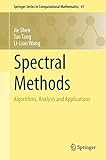Spectral methods : algorithms, analysis and applications
Series: Springer series in computational mathematicsPublication details: Heidelberg: Springer Berlin, [c2011]Description: 470 pISBN: 9783540710400Subject(s): Spectral theory (Mathematics) | Partial differential equationsLOC classification: QC20.7.S64Online resources: Click here to access online| Item type | Current library | Shelving location | Call number | Status | Date due | Barcode | Item holds |
|---|---|---|---|---|---|---|---|
 Book
Book
|
ICTS | Rack No 9 | QC20.7.S64 (Browse shelf (Opens below)) | Available | 02848 |
Browsing ICTS shelves, Shelving location: Rack No 9 Close shelf browser (Hides shelf browser)

|

|

|

|

|

|

|
||
| QC 20.7.S Interacting particle systems | QC 20.7.S Stochastic processes for physicists | QC20.7.S3 Scattering amplitudes in gauge theory and gravity | QC20.7.S64 Spectral methods : algorithms, analysis and applications | QC20.7.S64 Spectral methods for time-dependent problems | QC20.7.S8 Stochastic processes in physics and chemistry | QC20.7.T65 Topology and Geometry for Physicists |
1. Introduction
2. Fourier Spectral Methods for Periodic Problems
3. Orthogonal Polynomials and Related Approximation Results
4. Spectral Methods for Second-Order Two-Point Boundary Value Problems
5. Volterra Integral Equations
6. Higher-Order Differential Equations
7. Unbounded Domains
8. Separable Multi-Dimensional Domains
9. Applications in Multi-Dimensional Domains
Along with finite differences and finite elements, spectral methods are one of the three main methodologies for solving partial differential equations on computers. This book provides a detailed presentation of basic spectral algorithms, as well as a systematical presentation of basic convergence theory and error analysis for spectral methods. Readers of this book will be exposed to a unified framework for designing and analyzing spectral algorithms for a variety of problems, including in particular high-order differential equations and problems in unbounded domains. The book contains a large number of figures which are designed to illustrate various concepts stressed in the book. A set of basic matlab codes has been made available online to help the readers to develop their own spectral codes for their specific applications.---summary provided by publisher


There are no comments on this title.